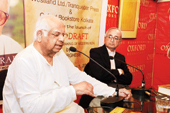 |
| Somnath Chatterjee (left) and B.G. Verghese at the launch. Picture by Pradip Sanyal |
The stage was set for a long, erudite session at the Oxford Bookstore on the first of this month. An old chest of drawers with books sought to create an old-world feel as a couple of senior observers of Indian politics took the dais.
It was the launch of First Draft: Witness to the Making of Modern India by journalist B.G. Verghese, who had former Lok Sabha Speaker Somnath Chatterjee do the honours.
Journalism is often called the first draft of history. “History is a worm’s eye view of the events,” said Verghese, comparing the two disciplines.
“In journalism, one has to stick out one’s neck and make speculations while historians have the luxury of knowing the outcome.” And so Verghese took a risk when he wrote on Tuesday what Nehru did on Monday. And faced public outrage when he said Nehru was getting on in years...and was overburdened.
“In that age of sycophancy, this was almost blasphemy. I wrote not to denigrate anyone but to put things in perspective,” said the former newspaper editor.
What troubles Verghese is that Indians do not have a sense of history. Indian history has been written by others, he said. Events are shrouded in secrecy. “Things during and after Independence are still not known.” So there are Chinese, American and French views of India, but no Indian view of India.
“And since we do not have a sense of history, there is largescale ignorance and illiteracy among decision-makers, policy-makers and bureaucrats. I shudder when I hear them saying Kashmir should be dealt with on a war footing when we have already lost the war,” said Verghese.











